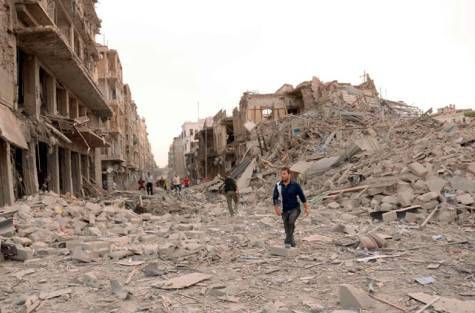Where Will Turkey Put All Its Syrian Refugees?

ANKARA, Turkey -- As the Syrian civil war shows no signs of relenting, Syria’s neighbor to the north is feeling the pain as well. Turkey is scrambling to find a place for the influx of Syrians fleeing the violence in their country, and pushing -- unsuccessfully, so far -- for some form of intervention to stop the flow. And as of this week, another problem has been added: Turkey has decided it can respond militarily to bombing inside its borders by Syrian troops.
The United Nations refugee agency has forecast that Turkey could host as many as 280,000 refugees by the end of the year -- almost three times the 100,000 Ankara announced last month.
The number of refugees seeking asylum in Turkey has already topped 93,000, and the scale of the challenge is forever growing as thousands continue to flee the war-torn nation.
Turkey previously urged the U.N. to create a safe haven within Syria, but this would require a U.N resolution for a no-fly zone -- a measure that is unlikely to be approved while Russia and China consider it a violation of Syria’s sovereignty.
The deadlock at the U.N. has left Turkey with its hands tied, but Wednesday’s cross-border shelling could give impetus to the setting up of a safe zone within Syria itself, according to human-rights activist Peter Clifford.
On Thursday, Turkey’s parliament authorized troops to launch cross-border operations against Syria following the shelling of a Turkish town, which killed five people. (Syria has admitted to the incident, called it a mistake, and apologized.) Turkey's military response has raised concerns about triggering war between the two nations. But Prime Minister Recep Tayyip Erdogan said the move was a deterrent. "We want peace and security and nothing else. We could never be interested in something like starting a war," he said.
Louay Sakka, executive director of the Syrian Support Group, a U.S.-based organization garnering support for the Free Syrian Army, said the authorization from the Turkish parliament could help protect Syrian refugees -- and do so inside Syria. “This is a major development and could move the Turks one step closer to establishing the ‘safe zone’ in the border regions,” he said. “This sends a political message, and Turkey may well be able to further protect those refugees [from such attacks] whilst they are still inside Syria," he added.
While NATO, the White House, and the Pentagon have been vocal in condemning the Syrian cross-border attack, Ankara has no backers for broader military action. Turkish officials other than the prime minister have also said that further armed action isn’t likely. Therefore, it is difficult to predict how effective the mandate will be in helping refugees within Syria.
Although more refugee camps are being prepared in Turkey, the U.N. refugee agency has warned that its funding is scarce. Imminent harsh winter conditions will not just require tents, but more clothing, blankets, and heaters.
“I would be very surprised if the Turkish government agreed to take anything like 280,000 refugees,” said Clifford. “Apart from the money that is not available and the logistics, Turkey has its own population to consider. Many Turks, as I understand it, are already unhappy [with] the resources the government is giving to the refugees.”
As tensions mount between refugees and locals in the bordering region of Antakya, Turkish police have been forcing out Syrian refugees living in rented homes.
“We are trying to guide and suggest people who arrived legally or illegally to go either into the camps, if they have arrived illegally, or suggesting the others to move to nearby or different cities," a Turkish official told CNN.
Not all Turks eye the Syrians negatively. Sunni Muslim Turks who have close ties with neighboring Syrian communities have criticized the police crackdown on refugees, with whom they share a religion (Syrians, including most insurgents, are predominantly Sunni, while the Damascus regime is dominated by the Alawite sect, an offshoot of Shiite Islam.)
Still, the Turkish Foreign Ministry is concerned that the continuing surge of refugees will pose a security risk, and fears that radical Islamic militants will enter Turkey under the guise of refugees. Even if Turkey does have the capacity to house more refugees, this will likely be the core reason for Ankara to close off its borders.
Meanwhile, a disproportionate number of women and children who are seeking refuge in Turkey, Jordan, and Lebanon are in great need, according to Save the Children. Women and children make up 75 percent of the refugees, and those housing them are stretched to meet their needs.
Foreign Minister Ahmet Davutoglu has said that Turkey has reached its “psychological threshold” for housing refugees, and, while efforts will continue for the time being, it is unlikely that Turkey will stretch itself much further without solid international support or least a security zone inside Syria.
© Copyright IBTimes 2025. All rights reserved.





















